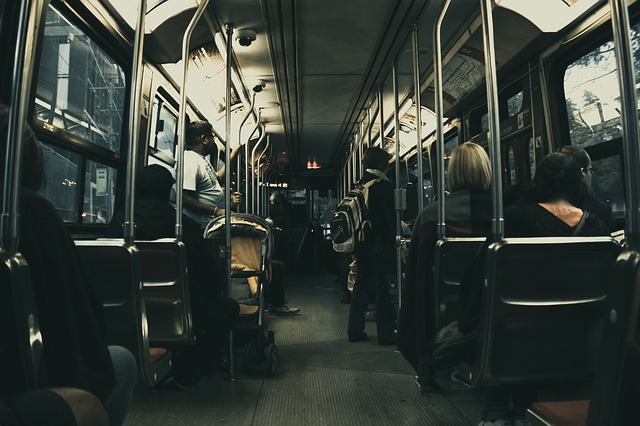A few months back, I finished my shift waiting tables and hopped on a Los Angeles metro bus with a rainbow-shaped bag on my arm. The bus was beyond full, so I resigned myself to standing, despite my sore feet. After a few stops, a seat opened in the rear of the bus and I rushed to claim it. As I sank gratefully into it, a man across the aisle smiled in greeting and mumbled a hello. I responded in kind and put in my headphones, content to relax until my stop.
Realizing I’d checked out, the man gave me a once over and his eyes fell on my rainbow bag. His smile melted and he wasted no time in launching a full verbal attack on me. He began his tirade by yelling that I was “a fucking fag” and making foul comments on his understanding of queer sex. He screamed obscenities I don’t feel comfortable repeating, and the whole incident culminated in a threat to “fix me” by raping me. Though I was on a bus that was filled to the point of riders crowding the aisles, not one person met my gaze or said anything to support or defend me as the incident unfolded.
In Los Angeles in 2017, no one said a single word.
I moved to LA five years ago to live in a city where my queerness wasn’t an issue, where the majority of the people don’t do a double take if a same-sex couple passes by them hand-in-hand on the street, and where I could feel free to be me. Every one of my LGBTQ friends moved here for the same reason. For most of our time here, LA has provided us the safety we were craving. However, in the last year or two, I’ve begun to notice headlines and hear stories proving that even big liberal cities aren’t immune to pushback due to the recent wins of the LGBTQ community or to the uptick in discrimination inspired by the words and actions of our newest president.
My incident on the bus ended without physical confrontation: the man exited the bus one stop before mine and I made it home untouched. Unfortunately, my story is only one in a growing trend of hate-motivated violence and hate crimes across the nation. In 2016, Washington, D.C. reported a 59 percent rise in hate crimes targeting members of the LGBTQ community, and LA saw a 25 percent increase in anti-LGBTQ hate crimes.
To make matters worse, intersectional biases place some members of the LGBTQ community at a higher risk of hate violence than others and make it harder to categorize which bias the hate crimes fall under. In most cities that collect data, reported crimes show trans women of color suffering disproportionately more hate violence than any other group. The surge in anti-LGBTQ hate looks to be continuing: earlier this month, the National Coalition of Anti-Violence Projects released a report that said that as of August 2017, more LGBTQ individuals have been murdered in hate-motivated attacks in the United States this year than in all of 2016. The NCAVP did not include the 49 deaths at Pulse Nightclub in this number.
Clearly, the rise in animosity towards the LGBTQ community is not anecdotal. After my experience on the bus, I’ve been hesitant to carry my rainbow bag around the city. I’ve caught myself re-examining what I wear and how I act: suddenly, I’m cautious of how “out” I want to be outside of designated safe spaces. It’s something I hate to admit to: I’ve been proud to live my life completely out of the closet since I moved to LA. At the same time, I don’t want to let hate “win,” and on days when I feel like a badass, I rock my rainbows and everything they represent loudly, ready for whatever comes my way.
However as each new story of hate against the community makes it way onto my news feed or across my television screen, I catch myself wondering if it’d be safer to pass as straight. Deciding how to present ourselves is a struggle for many in our community, and one with no universal answers. My best friend, who doesn’t pass, reached out to me the other night to have a serious discussion on which countries we could move to if the hatred in this nation reached a high enough point that we needed to flee. Safe spaces—places where we can discuss our feelings and be ourselves without judgement or ridicule—have become key in maintaining sanity.
If I learned anything on that bus, it’s that outside of safe spaces, I can’t count on anyone else to have my back; I have to hold my own. I’ve come to terms with the fact that some days I may have more fight and bravery in me than others and have given myself permission to present accordingly. With so much hatred, uncertainty, and fear swirling around the country, I need to be my own ultimate safe space.


